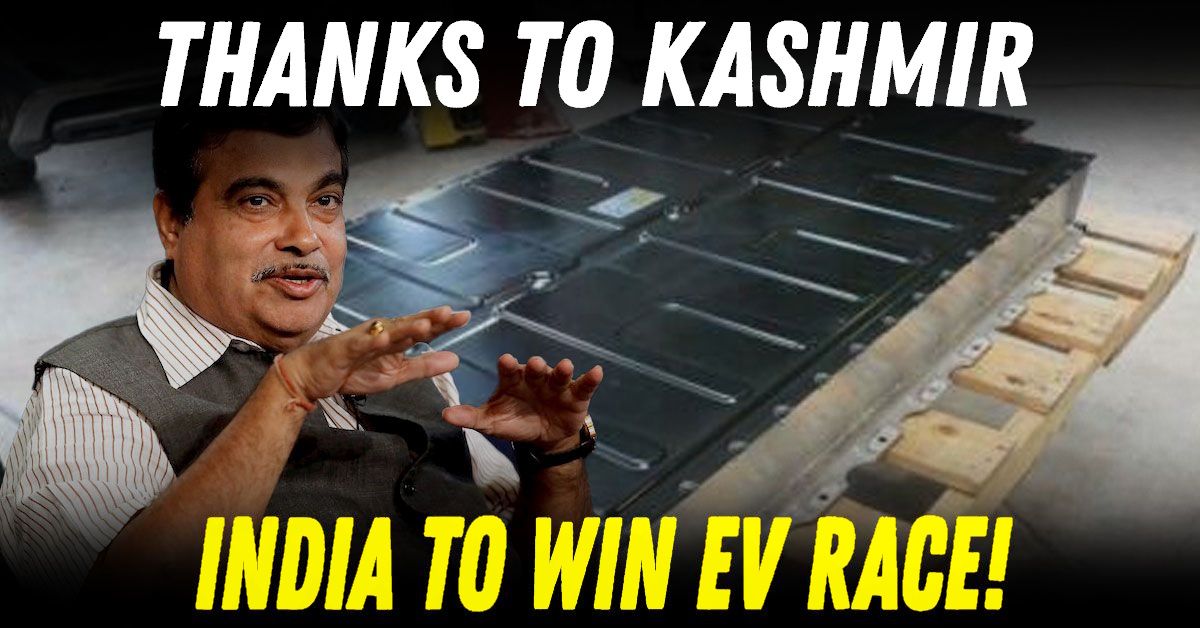Kashmir Will Make India Beat China In Electric Vehicle Race; Explains Nitin Gadkari


India has set an ambitious goal of beating China in the global electric vehicle (EV) race. The nation aims to be a leader in the clean energy sector. Union Minister Nitin Gadkari recently addressed the gathering at the Times Drive Auto Summit & Awards 2025 (powered by HPCL), during which he claimed that the six-million-ton lithium reserve in Jammu and Kashmir (J&K) could be a potential game-changer for India's EV industry.
Gadkari said that if the J&K reserves are utilised effectively, it could free India from its dependence on countries like China for Lithium imports. We could eventually see India emerge as a key global player in battery production. Curbing the dependence on China stands particularly important as geopolitical tensions between the two nations have lately been on the rise.
Huge reserves of Lithium were discovered in the Reasi district of J&K. It attracted significant buyer interest from within the industry. The first auction was organized in November 2023 at the G3 exploration level. It however, failed to attract ample bids. The second attempt failed as well. The lack of detailed exploration data is being cited by experts as the primary reason for these failed attempts.
To overcome this roadblock, the Indian government now plans to advance exploration to the G2 level within the next six months. However, experts warn that a more comprehensive study could take up to two years. Rushing the process, they caution, might lead to another failed auction, further delaying India’s ambitions of lithium self-sufficiency.
Interestingly, the Union Transport Minister recently made a claim that electric vehicle prices will fall in the next six months, attaining parity with petrol counterparts. He could be backing these on the possibility of a successful G2 exploration, and other factors. The claim and the timeframe initially sounded tall and unreal. However, connecting the dots and a deeper analysis of the landscape suggest that the claims could come to fruition if the G2 exploration succeeds.
Currently, India relies almost completely on imports for meeting its Lithium needs. Hong Kong and China are the major suppliers. In 2023-24 alone, it spent $2.9 billion on lithium-ion battery imports. With the increasing demand for EVs here, securing a domestic lithium supply has become a strategic necessity.
On a global scale, out of 98 million tonnes of identified lithium resources, only 26 million tonnes are classified as reserves. The largest deposits are known to be in Chile, Australia, and Argentina. If India can successfully extract its Lithium, it could significantly cut down on imports and build a robust battery manufacturing ecosystem locally.
Well, the primary reason to believe so is the timing. The country wants to start its Lithium battery race, when several big players have made significant progress globally, and have been flooding the international market with surplus produce.
This supply glut has caused a major fall in electric vehicle battery prices. From the $151/kWh mark in 2023, they have fallen to $100/kWh in 2025. Analysts predict that the fall could slow down slightly this year, but a climb back could only be a distant possibility.
In many cases now, importing batteries makes more sense financially than setting up factories locally. Even if a company were to set up gigafactories here, it will have to depend on China for the manufacturing equipment and machinery. Thus, it won't be a factory alone that needs to be set up, but an entire ecosystem.
We believe that a proper, controlled utilisation of India's Lithium reserves will greatly benefit the EV ecosystem here. EV prices could fall further, boosting the domestic demand. However, an untrammelled development project could turn out to be fatal to the environment and immediate ecosystem. Thus, deep researches need to be done and the government should take a data-driven and technology-backed approach to unlocking the true potential of these reserves.